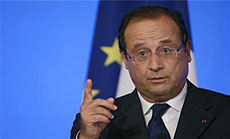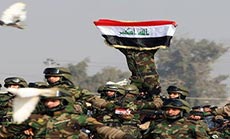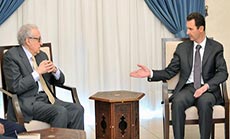Power Balances Slow Down OIC’s Restriction Attempts on Syria

The Western states, in cooperation with Turkey and some Arab states, are attempting to complete the political and economical restriction on Syria. Yet, after the resolutions of "the Arab League", which breached the principle of the Arab Convention; also after the economic sanctions decided by the OIC executive committee last Sunday, these states appeared to be unable to make "the Organization of Islamic Cooperation" (OIC) issue a strict political resolution - like some Gulf states had been expecting.
This disability, in fact, was revealed by the ambiguous talk of the OIC Secretary General Ekmelddin Ihsanoglu in the end of the OIC's urgent meeting in Jeddah; whereby Ihsanoglu called for putting an end to bloodshed without naming the side holding responsibility for that. As well, Ihsanoglu admitted that Russia and China would definitely veto against the transfer of the case of the Syrian crisis to the United Nations Security Council (UNSC).
The Syrian political analyst; also the Head of "ad-Derasat Center" ("the Studies Center") in Damascus "Hamidi el-Abdullah" confirms that the OIC would have suffered a great disassociation had it decided to issue a certain resolution against Damascus. El-Abdullah declares: "Some states, on top of which is Iran, are clearly influential to the OIC. So do some friendly states in south eastern Asia and "the Commonwealth of Independent States" (CIS; which includes 12 former Soviet republics), which are keen to being in good terms with Moscow."El-Abdullah adds that theses states "strictly oppose any sanctions against Syria and call for resolving the Syrian crisis through dialogue."
El-Abdullah also sees that "the Gulf States have bet on a negative role by Riyadh which might influence the OIC since its headquarters is in the Saudi-Arabian City of Jeddah. As well, they've made their bet upon hope for a certain role by Ihsanoglu of the Turkish nationality that exposes him to the influence of the Turkish government."However, the Syrian analyst is confident that "pushing for a resolution like the ones issued by "the Arab League" has been very difficult in regard to the difference of the balances within the OIC." He points out that "Damascus has counted on its allies; on top of which have been Iran, Russia, and China; whereby these states have adhered to their stances among all states of the world."El-Abdullah points out another point of strength with respect to the Syrian regime: "For more than eight months, the Syrian regime has gained popular support."
He continues, "According to the Western sources - the US sources in particular, the protests have only been held in six districts among fourteen: Daraa, Rif Dimashq, Hama, Edleb, Hamas, Deir al-Zour; whereby together these districts include 30% of all Syrian residents." El-Abdullah then reveals that "the percentage of the residents of these six districts participating in the protests hasn't exceeded 40 %."El-Abdullah concludes that "the Syrian people's majority hasn't participated in the protests." Besides, he explains that "the Syrian regime couldn't have survived steadfastly had real public protests been held against it as in the case of Egypt and Tunisia."
The Syrian analyst adds that "the public support has allowed the regime to be steadfast; whereby the majority of the citizens have an inclination to stability because of realizing the tragedies of instability in the neighboring states, particularly in Lebanon and Iraq; also because of realizing the condition of uncertainty in Egypt, Libya, and Yemen."
He considers that "when the Western bet on the protests failed, the West resorted to reinforcing armed groups. Nevertheless, this has failed so far since these groups have suffered painful coups." The Syrian analyst finally says: "The West and some Arabs are trying to divide the business sector of the Syrian regime; this is why European, American, Arab, and recently Turkish sanctions have been imposed on Syria. Yet, this choice won't be successful, for Syria's three neighboring states (Iraq, Jordan, and Lebanon) refuse the sanctions resolution, and they are not going to abide by it."
Comments

France’s Hollande in Qatar for Warplane Deal
10 years ago
Iraq Police Dismantles Al-Qaeda Protest Site
11 years ago

